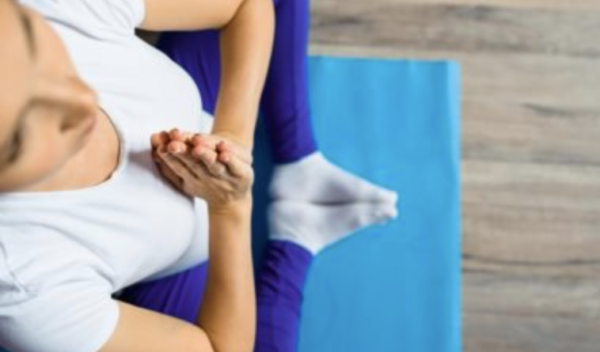Articles, In the Press, Resources, Tiffany Cruikshank, Yoga Medicine® News
Healthy Habits You Should Always Do at Night
Lisa Marie Conklin for Reader’s Digest Online shares 12 healthy habits to help you get better sleep, and live a healthier life. Tiffany Cruikshank, founder of Yoga Medicine, shares an easy yoga practice to do before bed.
12 Healthy Habits You Should Always Do at Night
Think that brushing your teeth and washing your face are the only things you should do before hitting the sack? Think again. We asked the experts for more health moves we should always do before bedtime.
Use mouthwash
 Brushing your teeth and flossing are important steps in maintaining a cavity-free mouth, but that’s not all you should be doing for healthy teeth, according to Scott B. Eisen, DDS at Catonsville Dental Care. “While we sleep, we produce less saliva and our mouths become dry,” he warns. “Saliva is the body’s natural neutralizer of the cavity-causing acids that are byproducts of the food and bacteria we neglect around our teeth and gums.” So use a mouthwash. While not a replacement for brushing and flossing, mouthwash is a healthy defense against bacteria and plaque.
Brushing your teeth and flossing are important steps in maintaining a cavity-free mouth, but that’s not all you should be doing for healthy teeth, according to Scott B. Eisen, DDS at Catonsville Dental Care. “While we sleep, we produce less saliva and our mouths become dry,” he warns. “Saliva is the body’s natural neutralizer of the cavity-causing acids that are byproducts of the food and bacteria we neglect around our teeth and gums.” So use a mouthwash. While not a replacement for brushing and flossing, mouthwash is a healthy defense against bacteria and plaque.
“Using an antiseptic or fluoridated mouthwash at night can help maximize the benefits of the rinse, without them being quickly washed away by food and drink,” says Dr. Eisen. The type of mouthwash will depend on your specific needs. “Antiseptic rinses, like Listerine, reduce oral bacteria and plaque and help prevent gingivitis. Fluoride rinses, like ACT, can help remineralize enamel and reduce sensitivity in people who are at a higher risk for cavities,” says Dr. Eisen. These are the 7 things successful people do before bed.
Go to bed at the same time every night
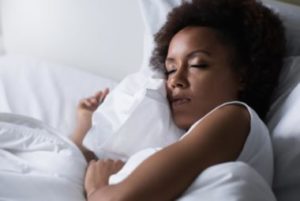 Yep, even on the weekends. A lot of important things go on in our body’s and mind’s while we’re snoozing, so it’s important to keep a consistent sleep schedule. “Long term health depends on the regeneration that occurs during deep sleep,” says Jacqueline Blakely, naturopathic doctor at Holtorf Medical Group. Hormones secreted during sleep stimulate important functions such as liver cleansing, muscle building, tissue regeneration, the breakdown of fat stores, and normalization of blood sugar. “Sleeping at odd hours and at different times messes up our natural sleep cycle,” says Dr. Blakely. When we go to bed at the same time and wake at the same time, it trains our body for sleep. You’ll also want to try these 13 secrets for better sleep, according to sleep doctors.
Yep, even on the weekends. A lot of important things go on in our body’s and mind’s while we’re snoozing, so it’s important to keep a consistent sleep schedule. “Long term health depends on the regeneration that occurs during deep sleep,” says Jacqueline Blakely, naturopathic doctor at Holtorf Medical Group. Hormones secreted during sleep stimulate important functions such as liver cleansing, muscle building, tissue regeneration, the breakdown of fat stores, and normalization of blood sugar. “Sleeping at odd hours and at different times messes up our natural sleep cycle,” says Dr. Blakely. When we go to bed at the same time and wake at the same time, it trains our body for sleep. You’ll also want to try these 13 secrets for better sleep, according to sleep doctors.
Snack on this combo
 Fiber, protein, and healthy fats are the combo you should always eat at night if you’re going to snack says Jillian Michaels, health and wellness expert and creator of the Jillian Michaels App. “These foods promote satiety and contain tryptophan which aids in better sleep and better mood,” says Michaels. Her go-to snacks are: turkey lettuce tomato roll ups, a handful of dry roasted or raw almonds, organic Greek yogurt and a handful of blueberries, hummus and veggies, organic string cheese, or a hard-boiled egg.
Fiber, protein, and healthy fats are the combo you should always eat at night if you’re going to snack says Jillian Michaels, health and wellness expert and creator of the Jillian Michaels App. “These foods promote satiety and contain tryptophan which aids in better sleep and better mood,” says Michaels. Her go-to snacks are: turkey lettuce tomato roll ups, a handful of dry roasted or raw almonds, organic Greek yogurt and a handful of blueberries, hummus and veggies, organic string cheese, or a hard-boiled egg.
Sugar, starch, or fried and fatty foods are combos you always steer clear from at night. “Be sure to avoid starches and sugars as those drive up insulin levels, causing restless sleep and interference with the bodies release of HGH, our immunity boosting, anti-aging, fat-burning hormone,” says Michaels. Other foods to always avoid at night are fried or fatty foods, which result in delayed gastric emptying and could lead to an upset tummy or bloating, causing more tossing and turning instead of snoozing, says Steven Bentley, MD, a retired emergency physician. Fermented foods produce gas and bloating as well. “It’s important to refrain from these foods so that you avoid stomach aches and pain,” says Bentley.
Do some easy yoga
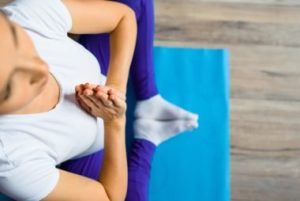 If you sit all day, chances are your hips and hamstrings are tight by the end of the day. “The tension in these tissues compounds over time and plays a significant contributing role in back & hip pain,” says Tiffany Cruikshank, founder of Yoga Medicine and author of Meditate Your Weight. To get relief try these two Cruikshank recommends:
If you sit all day, chances are your hips and hamstrings are tight by the end of the day. “The tension in these tissues compounds over time and plays a significant contributing role in back & hip pain,” says Tiffany Cruikshank, founder of Yoga Medicine and author of Meditate Your Weight. To get relief try these two Cruikshank recommends:
Supine hamstring pose: Lie on your back and loop a towel or strap around the ball of your right foot, then extend your leg in front of you. (The key is to find a gentle stretch where your low back and hips can still relax.) Bend the raised leg if your leg is lower than the height of your hips, this will put a little slack on your hamstrings so you can relax. Take a few deep breaths to unwind as you stay for 30 to 60 seconds then repeat on the left side.
Figure four pose: Lie on your back with your feet on the floor. Take your right ankle and place it on your left knee. If you feel a stretch in your hips here simply stay put, otherwise you can draw your left leg in toward you and grab the back of your left thigh or your left shin. Relax your head and shoulders as you lean your torso back into the floor. Take a few deep breaths as you relax your low back and hips here. Stay for 1 to 2 minutes then repeat on the second side. Here are 9 more easy yoga poses you can try at night.
Swallow probiotics

Gut health is a popular topic these days and for good reason. The bacteria in the gut have a major influence on our health besides just digestion. More studies now point to gut health influencing obesity, cancer, depression and more. If you’re taking probiotics and want them to be more effective Will Cole, DC, suggests taking them at night. “Probiotics work best not taken with food so that they don’t interfere with your digestive enzymes. Right before bed would is an optimal time since it’s a few hours past dinner and several hours before breakfast,” says Dr. Cole.
Try magnesium
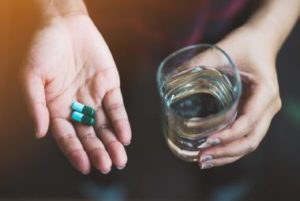
Magnesium carries a lot of clout. It’s responsible for over 300 biochemical reactions in the body, yet many of us aren’t getting enough of this essential mineral.
“It is so crucial to make sure you are getting this vital nutrient as it aids in optimal thyroid health,” says Dr. Cole.
“Taking magnesium right before bed can be the best time as it promotes better sleep. It not only relaxes muscles for more restful sleep but helps the calming neutransmitter, GABA, in your brain,” says Dr. Cole.

Take calcium
Calcium and magnesium are the dynamic duo of better sleep. “Your body uses calcium at night to help relax your muscles and aids a better night sleep by helping your nervous system. Magnesium helps move calcium from your muscles to the rest of your body for other uses,” says Dr. Cole. When you’re popping a magnesium pill at night, reach for some calcium too to get the optimal effects of both supplements for overall health and good night’s rest. Here’s how to know if your muscle cramps are a sign you’re not getting enough calcium.
Drink hot lemon water

According to Devan Kline, a personal trainer and co-founder of Burn Boot Camp, it’s always a good idea to balance your PH level and nighttime is great time for sipping lemon water. “Having a glass of lemon water before bed will help create alkalinity in your body. With the majority of our foods being highly acidic it’s important to constantly balance your PH level,” says Kline. “Disease has a lot tougher time thriving in an alkaline environment rather than an acidic one. Lemon water will help you combat acidity,” he claims.
Find out 12 insane benefits of drinking lemon water in the morning, too.

Consider taking cornstarch
Nocturnal hypoglycemia, is when blood sugar drops at night. This condition is quite common if you have type 1 diabetes. Symptoms such as night sweats, poor sleep, or waking with shakiness, sweating, or anxiety may be a sign of nocturnal hypoglycemia. Kent Holtorf, MD, medical director at Holtorf Medical Group, recommends taking two to three teaspoons of uncooked cornstarch at bedtime.
Cut back on booze

We know it may be a buzz kill (pun intended), but according to Dr. Blakely, alcohol is full of sugar and can make for a lousy night of sleep. “Alcohol may seem like it helps you fall asleep, but it doesn’t allow for a restful night. Studies have shown that alcohol can disrupt neurotransmitters in the brain that regulate sleep cycles like REM, your deep sleep cycle,” says Blakely. If you’re menopausal, booze before bed can worsen night sweats
and hot flashes. “Skip the beer and try a tea with hops. Hops are calming on the nervous system and can provide a restful night sleep.” Here’s how to easily cut back on alcohol.

Cut back on caffeine (yep, dark chocolate too)
Always avoid caffeine, including dark chocolate, soda and coffee in the evening. Caffeine has a six-hour half-life, which means it could take a full twenty-four hours to work its way out of your system. The cup you had at eight o’clock this morning could leave as much as 25 percent of the caffeine in your body at 8:00 tonight, depending on your body chemistry and genetics. That coveted piece of dark chocolate whispering to you after dinner? Sure, it’s full of healthy benefits but Michael Breus, PhD of SleepScore Labs and author of The Power of When says that a two-ounce chunk of 70 percent dark chocolate has 70 mg of caffeine, about the same as a shot of espresso—not exactly a nighttime drink. “Limit consumption of alcohol and caffeine after 2:00 PM,” says Dr. Breus.
Power down
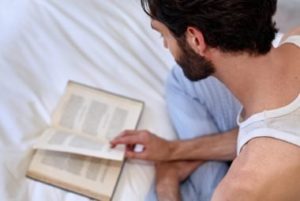 You can power down, as Dr. Breus calls it, by lowering your body temp, blood pressure, and levels of the stress hormone cortisol. This downshift should occur the hour before bedtime and includes three 20-minute sections:
You can power down, as Dr. Breus calls it, by lowering your body temp, blood pressure, and levels of the stress hormone cortisol. This downshift should occur the hour before bedtime and includes three 20-minute sections:
First 20 minutes: “Do things you must get done. If you don’t you will think about them while you’re trying to fall asleep,” says Dr. Breus. These may include making a to-do list for the morning, journaling, and preparing for tomorrow in whatever way may make your morning run smoother.
Second 20 minutes: “Do your nightly hygiene routine, which may include taking a hot bath or shower-in a dimly lit room, or one with the special sleep bulbs which filter out blue wavelength light,” suggests Dr. Breus.
Final 20 minutes: Do relaxing activities such as light stretching, read magazines or a book—no electronics. Have casual conversations with friends and family. You can play cards or games, just make sure you don’t get too excited or competitive. Meditate, pray or read scripture. Then it’s off to snoozeland. Here are 19 things you should be doing all day long to ensure a better night’s sleep.













